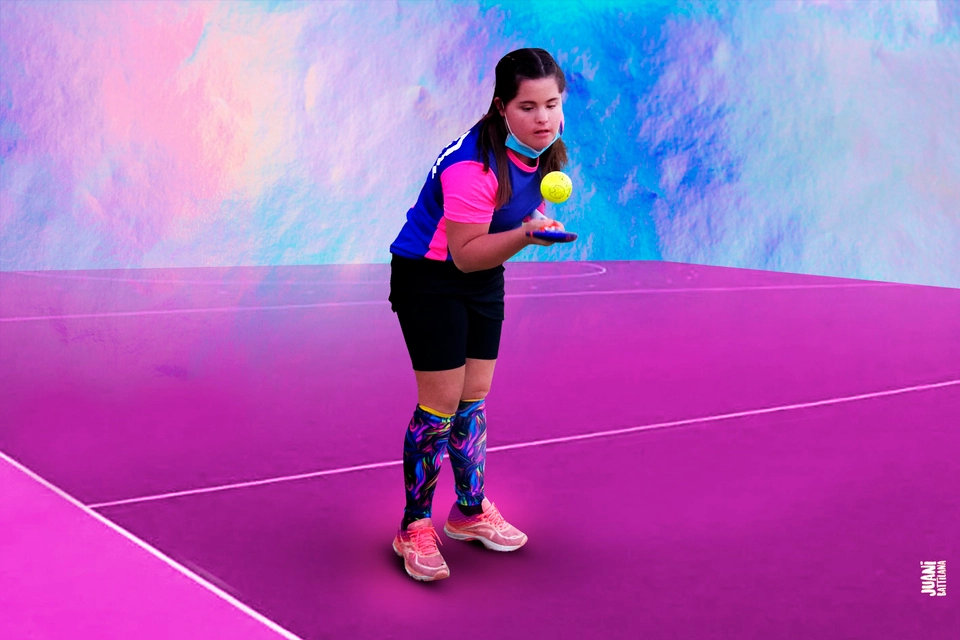
Sport was not and never will be simple physical training. Like any exercise, it activates brain functions that are essential for general cognitive development, but also generates experiences and transmits important skills for life itself. Experts agree that –among other things– disciplines that are practiced as a team promote integration and generate a sense of belonging. Therein lies the importance of an undertaking project like that of Silvina Forrester and Peter Gorrissen, Clara's mother and father, who was born with down syndrome and has played hockey since she was 4 years old. “My husband, my other three children and I are sports fans and it was so good for Clari to play and belong to a team, that with Peter we said 'let's do this' and in September 2017 we started with Las Lionas”, Silvina reviews. There were 12 at the beginning, now there are 70 and men are also joining.
The turning point for Las Lionas was in 2018, when the Pan American Federation invited them to play an exhibition match at the Parque Roca Olympic Stadium after the two hockey semifinals of the Youth Olympic Games in 2018. Since then, that family project became a phenomenon that seems to have no limits. "We made tours to Mendoza, San Juan, they invited us from abroad and now they invited us to the special Olympics in Berlin 2023," says Silvina, who gives talks in the country and abroad and is consulted from different provinces where, from the experience of Las Lionas, inclusive hockey spaces are being opened
How was the origin of this inclusive hockey project?
– It arises from a passion, I have a passion for life, for sports and for what I do. Clari, my daughter, all her life she played in Belgrano and this began as a space of belonging and it continues to be that for girls, boys and families; a proposal where, however you play, you have your place. Hockey is a tool, but the most important thing is the independence that knowing each other gives them.
And the name of Las Lionas?
– That is because we feel identified with Las Leonas, which is the Argentine team, because we are as good and excellent as Lionel Messi and also because we are noisy ( 'lio', laughs), we love to train with music, dance and enjoy ourselves.
In your experience, what is the main challenge of inclusive sport?
– The first thing is to be brave because you are changing a paradigm, a mental model. I never said that someone with down syndrome wouldn't be capable of reaching goals. You also have to have limits, personally perhaps I demanded more of Clara at some point, but it is important to be open minded, to want to understand that life is for everyone, you do not have to stigmatize and decide that they cannot achieve goals. What I particularly do is spread the euphoria and passion that I have. You have to believe in the human being as a human being. Wisdom is not just being good at maths or history, it comes from somewhere else. Sometimes they ask me how I get them to achieve what I want. And what do I want? I want each of them to advance at their own pace and level, to practice the values that they bring from home, such as tolerance and patience. And it is incredible how they change and the environment is also changing
How are the training sessions?
– The Sports Department of the City of Buenos Aires gave us a space in Villa Devoto. We have a level of up to 10 years that is more interactive and coordination games, so that they can adapt. The other group, which is 10 to 15 years old, already plays matches and the older ones sometimes train all together and sometimes we divide them by levels. There is also a group of girls which ar more independent, they have more passion and more committed, who will be able to go out to compete around the world. Until the pandemic began, conventional clubs invited us, we would go and do an hour of training with the club's players as facilitators. In Las Lionas there is room for any girl or boy with Down syndrome or delayed maturation.
From what age can they be added?
- As from four years old. The other day they asked me about a 40 year old male, it is very difficult because we have just started with males, but he could come and try, perhaps he could come and be a helper, the space is there.
You mentioned that sometimes you were very demanding with Clara. What learnings did you have in that sense?
- Huge, it's a huge learning. My husband and I always wanted to teach our children to move forward, not to be a perfectionist but to know that you can achieve whatever you want. Clara went to conventional school all her life, she was integrated, but maybe, sometimes she was over demanded. She always had a social life, but when she started with Las Lionas, she started to relax a bit. When she talks in Television programs or radio, she stares at me as if seeking my approval, little by little I'm trying to blurt this out. It is not that I was looking for perfection in her but sometimes, trying to make her achieve as much as possible so that the society in which she lives does not judge her so much, I demanded it. It's hard.
- It is a reality of many fathers and mothers, but it also describes the importance of these spaces that allow the family to relax and see that their sons or daughters are capable and can be part of a team.
– In truth, the word inclusion should cease to exist, we should live in inclusion.
Are we very far from that?
